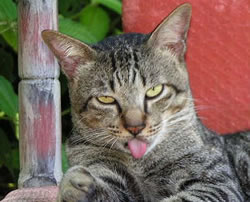 As I sit here writing this article, my ear is attuned to a certain sound that, when I hear it, always causes me to drop what I’m doing and go do something else.
As I sit here writing this article, my ear is attuned to a certain sound that, when I hear it, always causes me to drop what I’m doing and go do something else.
Oh, I’ve tried to resist that sound and I’ve actually managed to hold out for at most a minute before I may an excuse to myself and I get up in response.
You may be wondering what that sound is?
It’s the call of the White Cat.
And there’s a good reason why the call of the white cat has the effect it does on me. There is science behind my response. And if you’ve ever had a similar thing happen to you be glad to know we can’t help it.
There’s a certain type of urgent-sounding, high-pitched meow, and some cats can make this sound when they want to be fed.
The white cat is one of them and it’s a cry that he has worked on and developed over time, I’m sure.
The study shows that we humans find this particular cry annoying and difficult to ignore and I can attest that this study is right.
Here’s an excerpt from an article on the study which was conducted by Karen McComb of the University of Sussex:
“Cats know us
Previous research has shown similarities between cat cries and human infant cries.
McComb suggests that the purr-cry may subtly take advantage of humans’ sensitivity to cries they associate with nurturing offspring. Also, including the cry within the purr could make the sound “less harmonic and thus more difficult to habituate to,” she said.
McComb got the idea for the study from her experience with her own cat, who would consistently wake her up in the mornings with a very insistent purr. After speaking with other cat owners, she learned that some of their cats also made the same type of call. As a scientist who studies vocal communication in mammals, she decided to investigate the manipulative meow.
Tough to test
Setting up the experiments wasn’t easy. While the felines used purr-cries around their familiar owners, they were not eager to make the same cries in front of strangers. So McComb and her team trained cat owners to record their pets’ cries — capturing the sounds made by cats when they were seeking food and when they were not. In all, the team collected recordings from 10 different cats.
The researchers then played the cries back for 50 human participants, not all of whom owned cats. They found that humans, even if they had never had a cat themselves, judged the purrs recorded while cats were actively seeking food — the purrs with an embedded, high-pitched cry — as more urgent and less pleasant than those made in other contexts.
When the team re-synthesised the recorded purrs to remove the embedded cry, leaving all else unchanged, the human subjects’ urgency ratings for those calls decreased significantly. “
Cat behavior problems are a common complaint with people that are owned by them. Our office cats started out being complained about frequently but I’ve been pretty successful in getting them somewhat trained to be part of the office (this after having several ‘accidents’ here that good behavior could have fixed).
My advice to owners looking for help?
There are some good eBooks out on cat behavior problems that really can help in many situations and when those don’t work I usually recommend contacting a trainer..and if that does not work?
Well, then you sit there waiting for a certain sound…………….
![]()
VetLocator.com’s Daily Paws
VetLocator – where you can find
the right professional and the
right advice for your pet